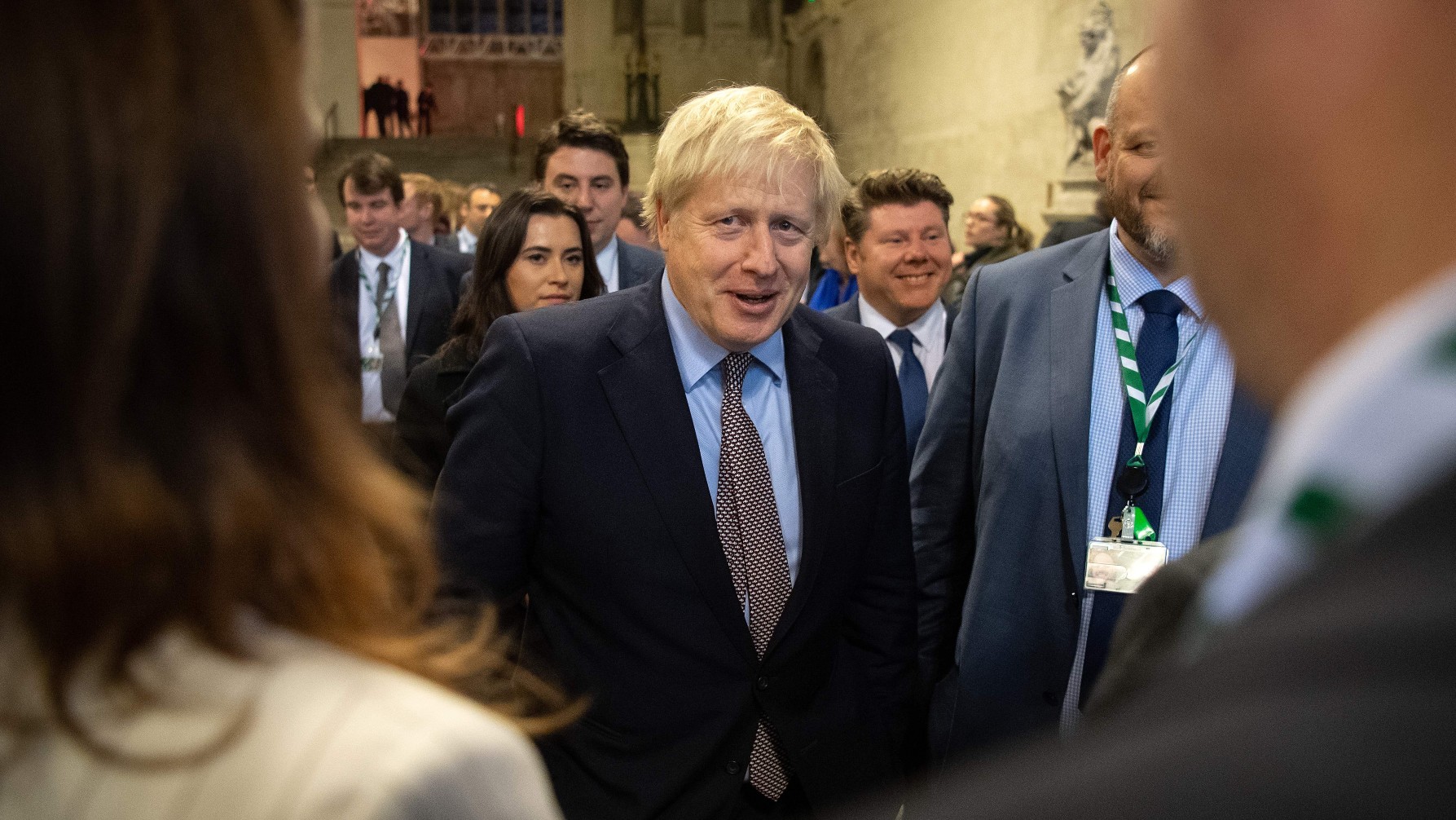Manifesto review: are the Conservatives really ‘Getting on with the job’?
Many pledges are on track despite the pandemic - but a few big ones have been broken

A free daily email with the biggest news stories of the day – and the best features from TheWeek.com
You are now subscribed
Your newsletter sign-up was successful
Boris Johnson’s Conservative Party Conference speech offered a vintage display of his humour and wordplay, but was notably light in policy. His overarching message yesterday, as summarised in the conference slogan, was that the government was “Getting on with the job”.
Having been blown dramatically off course by Covid-19, the prime minister is trying to return to the promises made in the run-up to the 2019 general election, when he won the biggest majority in three decades.
Here are some of the Tories’ main manifesto points, and how far they have come in delivering them.
The Week
Escape your echo chamber. Get the facts behind the news, plus analysis from multiple perspectives.

Sign up for The Week's Free Newsletters
From our morning news briefing to a weekly Good News Newsletter, get the best of The Week delivered directly to your inbox.
From our morning news briefing to a weekly Good News Newsletter, get the best of The Week delivered directly to your inbox.
Get Brexit done
“Get Brexit done” was not only the title of the Conservatives’ 2019 election manifesto, the phrase was used 23 times in the 64-page document. Pushing through Brexit would “restore confidence and certainty to businesses and families” and usher a “pent-up tidal wave of investment into our country”, promised the party.
Indeed, by 1 January 2021, Johnson was celebrating the UK’s first full day of freedom from the EU as an “amazing moment for this country”, reported the Daily Express, superimposing a Union Jack with the word “Freedom” on it on to the white cliffs of Dover on its front page.
But for others, such as The Guardian, the UK ended the EU era “in crisis” and “without fanfare”. “With the majority of England subject to tough restrictions, and hospitals warning of a calamitous winter coronavirus crisis in the weeks ahead, the chimes of Big Ben sounded across near empty streets at 11pm,” said the newspaper on New Year’s Day.
A free daily email with the biggest news stories of the day – and the best features from TheWeek.com
Tax freeze
The Tories promised not to raise the rates of income tax, National Insurance or VAT. “This is a tax guarantee that will protect the incomes of hard-working families across the next Parliament,” stated the party’s manifesto.
But by September this year, Johnson had announced a £12bn-a-year “tax raid” to address the funding crisis in health and social care, reported the Evening Standard. Johnson told MPs that breaking a manifesto commitment was not something he did “lightly” but that the new NI levy was “the reasonable and the fair approach”. The prime minister added that “Covid was in no one’s manifesto”. On the same day, the government announced that the triple lock on the state pension would be temporarily suspended next year – another broken manifesto promise.
Funding public services and levelling up
Despite the pandemic, an analysis of progress on Tory pledges by the Institute for Government (IfG) in May this year told a “surprising story”. It found that out of 287 commitments in the manifesto, 212 had been completed or had made varying levels of progress.
This included promises to increase funding for NHS England by 3.1% between 2019/20 and 2023/24 and to recruit 20,000 police officers. A pledge to create 50 million extra GP appointments per year fell by the wayside, however, with 36.6 million fewer GP appointments between March 2020 and February 2021. IfG warned that even after lockdown restrictions, “the target will be hard to meet without a large increase in primary care workforce”.
The 2019 manifesto promised “an agenda for levelling up every part of the UK” and to that end the government has announced spending on transport infrastructure, economic development and housing projects. Last month, the Ministry of Housing, Communities and Local Government became the Department for Levelling Up, Housing and Communities as part of what it has described as an “ambitious” plan to drive the levelling-up agenda.
‘Fixing’ immigration
“The vote to leave the EU was, among other things, a vote to take back control of our borders,” stated the 2019 manifesto. The Tories promised to introduce a “firmer and fairer Australian-style points-based immigration system” giving the UK “real control over who is coming in and out”, attracting people based on skills and contribution.
While not exactly the same as Australia’s, a UK points-based system was implemented in January 2021. In his speech yesterday, Johnson stuck to his word on controlling immigration, despite criticism in recent weeks that it has led to a severe labour shortage. “We are not going back to the same old broken model with low wages, low growth, low skills and low productivity, all of it enabled and assisted by uncontrolled immigration,” said the prime minister. Instead, he said he wanted to “invest in people, in skills and in the equipment, the facilities, the machinery they need to do their jobs”.
Reaching net zero by 2050
The Conservatives pledged to “lead the global fight against climate change by delivering on our world-leading target of Net Zero greenhouse gas emissions by 2050” and to use the UK’s position of hosting Cop26 in Glasgow “to ask our global partners to match our ambition”.
With the Cop26 summit now fast approaching, green issues are making their way up Johnson’s agenda. A 2021 progress report from government advisers on the Climate Change Committee, published in June, said ministers deserved credit for the “historic climate promises” they have made in the past year, but warned that they had been “too slow to follow these with delivery”. The committee urged the government to make the most of Cop26 to move forward. “Act quickly – be bold and decisive. Your moment has arrived,” it said.
Global Britain
The “Global Britain” slogan was yet to be coined when the 2019 manifesto was published, but the document did include a chapter with the less catchier title “We Will Strengthen Britain In The World”. The Tories promised an “outward-looking country” that champions security, law and human rights, including pledges to “proudly maintain our commitment to spend 0.7 per cent of GNI [gross national income] on development” and to increase free trade agreements, starting with the US, Australia, New Zealand and Japan.
“Less than one year later, and in the throes of a global pandemic, the Conservative government said it would be slashing the aid budget to 0.5 per cent of GNI – cutting spending from around £14bn in 2020 to £10bn in 2021,” reported the Financial Times. The reduction was “met with shock” from the aid sector, which had perceived the UK as a reliable development partner, with some saying “they are beginning to doubt the UK’s international strategy”, said the paper.
On trade, the BBC last month reported that the UK had so far signed agreements with the EU and 69 countries, the majority of which were “rollover” deals. They also included new pacts with Japan and Australia. However, a New Zealand deal is yet to materialise and hopes of a US agreement – the “big prize” promised by Johnson – were dashed on the PM’s recent trip to America, wrote Andrew Grice in The Independent. “Barack Obama’s pre-referendum intervention, which infuriated Johnson at the time, has come true: the UK is at the back of the queue.”
-
 James Van Der Beek obituary: fresh-faced Dawson’s Creek star
James Van Der Beek obituary: fresh-faced Dawson’s Creek starIn The Spotlight Van Der Beek fronted one of the most successful teen dramas of the 90s – but his Dawson fame proved a double-edged sword
-
 Is Andrew’s arrest the end for the monarchy?
Is Andrew’s arrest the end for the monarchy?Today's Big Question The King has distanced the Royal Family from his disgraced brother but a ‘fit of revolutionary disgust’ could still wipe them out
-
 Quiz of The Week: 14 – 20 February
Quiz of The Week: 14 – 20 FebruaryQuiz Have you been paying attention to The Week’s news?
-
 How corrupt is the UK?
How corrupt is the UK?The Explainer Decline in standards ‘risks becoming a defining feature of our political culture’ as Britain falls to lowest ever score on global index
-
 The high street: Britain’s next political battleground?
The high street: Britain’s next political battleground?In the Spotlight Mass closure of shops and influx of organised crime are fuelling voter anger, and offer an opening for Reform UK
-
 The MAGA civil war takes center stage at the Turning Point USA conference
The MAGA civil war takes center stage at the Turning Point USA conferenceIN THE SPOTLIGHT ‘Americafest 2025’ was a who’s who of right-wing heavyweights eager to settle scores and lay claim to the future of MAGA
-
 Is a Reform-Tory pact becoming more likely?
Is a Reform-Tory pact becoming more likely?Today’s Big Question Nigel Farage’s party is ahead in the polls but still falls well short of a Commons majority, while Conservatives are still losing MPs to Reform
-
 What does the fall in net migration mean for the UK?
What does the fall in net migration mean for the UK?Today’s Big Question With Labour and the Tories trying to ‘claim credit’ for lower figures, the ‘underlying picture is far less clear-cut’
-
 Asylum hotels: everything you need to know
Asylum hotels: everything you need to knowThe Explainer Using hotels to house asylum seekers has proved extremely unpopular. Why, and what can the government do about it?
-
 Five takeaways from Plaid Cymru’s historic Caerphilly by-election win
Five takeaways from Plaid Cymru’s historic Caerphilly by-election winThe Explainer The ‘big beasts’ were ‘humbled’ but there was disappointment for second-placed Reform too
-
 The new age of book banning
The new age of book banningThe Explainer How America’s culture wars collided with parents and legislators who want to keep their kids away from ‘dangerous’ ideas